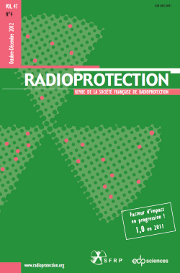No CrossRef data available.
Article contents
Stakeholder involvement in the management of effluent discharges from nuclear installations in France
Published online by Cambridge University Press: 17 June 2005
Abstract
The involvement of local stakeholders in the decision-making process regarding health, safety and environmental issues is developing in many countries. As far as the management of effluent discharges from nuclear installations in France is concerned, members of Local Commission of Information, including elected people and NGOs, are playing an increasing role in that respect. To deepen the understanding of these risk governance processes, a working group of experts from different institutions was set up in 2000 by the Institute of Radiation Protection and Nuclear Safety (IRSN). Several case studies concerning the involvement of stakeholders were performed, among them: the dialogue process around the discharges of the COGEMA La Hague reprocessing plant, the role of the local liaison committees of the Fessenheim and Gravelines nuclear power plants. Four main elements, contributing to the social trust, emerge from this analysis: 1) the social dynamics of the consultation process, notably with the emergence of “new" stakeholders such as elected people and NGOs; 2) the readability of the plant follow-up from the point of view of local stakeholders and their involvement in the decision process (the relay role of these “new" stakeholders); 3) the contribution of the institutional and pluralist expertise to the social trust (broadening of the range of values taken into account); 4) the issue of the local justification of the plant in the prospect of the sustainable development (no risk being acceptable without counter-parts). This paper addresses these different issues on the basis of the case studies in the perspective of examining the radiological risk governance process.
- Type
- Research Article
- Information
- Copyright
- © EDP Sciences, 2005




